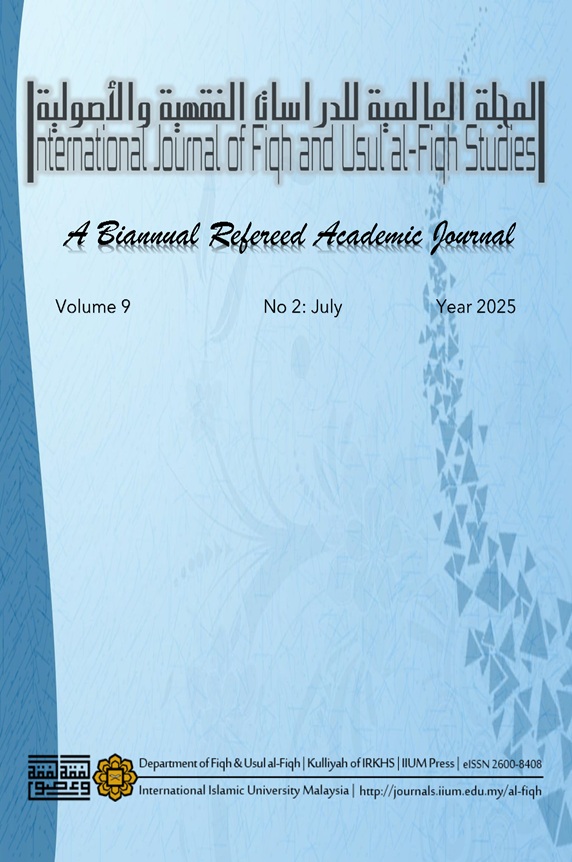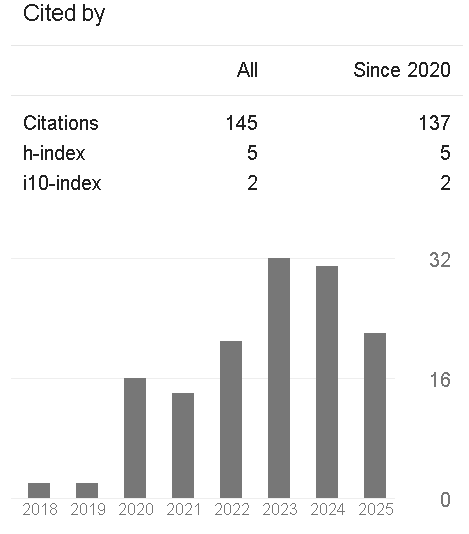The Eligibility of Forcibly Displaced Persons for Zakah: A Contemporary Maqāṣid-Based Fiqhi Study
DOI:
https://doi.org/10.31436/ijfus.v9i2.376Keywords:
Eligibility of forcibly displaced persons, zakah recipients, the poor and needy, objectives of Shariah, social solidarityAbstract
This study examines the eligibility of forcibly displaced persons to receive zakah, based on the significance of zakah as a fundamental pillar of Islamic law aimed at achieving social solidarity and economic justice, especially amid the urgent circumstances faced by displaced populations. The research problem arises from the ambiguity surrounding the inclusion of forcibly displaced persons within the categories of zakah recipients and the challenge of determining their eligibility in light of contemporary realities and the absence of precise criteria to apply classical rulings and modern fatwas to this shifting category. The study aims to clarify the juristic foundations that qualify forcibly displaced persons to receive zakah, analyse the extent to which these rulings are applicable in current contexts, highlight relevant contemporary juristic and maqāṣid-based approaches, and present actionable recommendations to enhance the zakah system to better serve this group. The research adopts a descriptive and analytical methodology, relying on textual analysis of Islamic sources, classical juristic opinions, and maqāṣid al-Sharīʿah, alongside contemporary reports on the realities of displacement. The study further distinguishes forcibly displaced persons from other related groups and establishes their potential classification under the categories of the poor (fuqarāʾ), the wayfarer (ibn al-sabīl), or those in debt (ghārimūn), depending on their circumstances, in line with the views of leading jurists. The study concludes that the eligibility of forcibly displaced persons for zakah is not merely a legal question but reflects the ethical and humanitarian spirit of Islamic law, emphasizing the need to institutionalize zakah distribution in a manner that ensures justice and human solidarity.
Downloads
Metrics
References
ʿAbd al-Ghanī, Ḥ. (2020). Ḥimāyat al-nāziḥīn. Dār al-Miṣbāḥ.
ʿAbd al-Ḥayy, W. (2014). Al-jughrāfiyā al-siyāsiyyah li-l-nuzūḥ. Anglo Bookstore.
ʿAbd al-Raḥmān, A. (2019). Ḥuqūq al-lājiʾīn fī al-Islām. Dār al-Shurūq.
Aḥmad ibn Sulaymān Ayyūb, & team of researchers. (2015). Mawsūʿat maḥāsin al-Islām wa radd shubuhāt al-laʾām (S. al-Durayʿ, Supervisor). Dār Īlāf al-Duwaliyyah.
Al-Ashhab, ʿA. al-F. ʿU., & Abūkayl, M. S. (2022). Al-zakāh bayna taḥdīd al-maṣārif wa taḥqīq al-maṣāliḥ. Al-Jāmiʿah al-Asmariyyah al-Islāmiyyah, Kulliyyat al-Sharīʿah wa al-Qānūn, Libya.
Al-Azhar al-Sharīf. (2018). Fatwa of the Senior Scholars' Committee on the permissibility of distributing zakat to Syrian and Iraqi refugees in Egypt. General Secretariat of the Senior Scholars' Committee. https://www.azhar.edu.eg
Al-Burnū, M. Ṣ. ibn A. (2003). Mawsūʿat al-qawāʿid al-fiqhiyyah. Muʾassasat al-Risālah.
Al-Hayʾah al-Khayriyyah al-Islāmiyyah al-ʿĀlamiyyah. (2021). Al-taqārīr wa al-barāmij al-khāṣṣah bi-l-zakāh wa al-ṣadaqāt.
Al-Ittiḥād al-ʿĀlamī li-ʿUlamāʾ al-Muslimīn. (2022). Qarārāt al-muʾtamar al-ʿālamī ḥawla al-nuzūḥ. Doha.
Al-Khalīl, A. ibn M. (1433 AH). Sharḥ zād al-mustaqniʿ.
Al-Khalīl, A. ibn M. (n.d.). Mukhtaṣar Khalīl. Maṭbaʿat al-Ṣabāḥ.
Al-Māwardī, ʿA. ibn M. (1999). Al-ḥāwī al-kabīr fī fiqh madhhab al-Imām al-Shāfiʿī wa huwa sharḥ mukhtaṣar al-Muzanī (ʿA. M. Muʿawwaḍ & ʿĀ. A. ʿAbd al-Mawjūd, Eds.; Vols. 1–19). Dār al-Kutub al-ʿIlmiyyah.
Al-Nawawī, Y. ibn Sh. (1996). Al-majmūʿ sharḥ al-muhadhdhab (Vols. 1–9). Dār al-Fikr.
Al-Qāḍī ʿAbd al-Wahhāb ibn ʿAlī al-Baghdādī. (2009). Al-muʿīn ʿalā madhhab ahl al-Madīnah (Ṣ. ibn ʿA. A. al-ʿUṣaymī, Ed.). Dār Ibn al-Jawzī.
Al-Qaḥṭānī, S. ibn ʿA. ibn W. (2010). Al-zakāh fī al-Islām fī ḍawʾ al-kitāb wa al-sunnah. Markaz al-Daʿwah wa al-Irshād.
Al-Qaradāghī, ʿA. M. al-D. (2017). Al-fiqh al-iqtiṣādī al-Islāmī wa-taṭbīqātuh. Dār al-Bashāʾir al-Islāmiyyah.
Al-Qaradāghī, ʿA. (2017, June 15). Al-zakāh kafīlah bi-taḥsīn al-awḍāʿ al-iqtiṣādiyyah wa inhāʾ al-faqr wa al-taṭarruf. Shabakat al-Fursān al-Ikhbāriyyah.
Al-Qaraḍāwī, Y. (1973). Fiqh al-zakāh: Dirāsah muqāranah li-aḥkāmihā wa falsafatihā fī ḍawʾ al-Qurʾān wa al-sunnah. Muʾassasat al-Risālah.
Al-Qaraḍāwī, Y. (1998). Fiqh al-zakāh: Dirāsah muqāranah li-aḥkāmihā wa-falsafatuhā fī ḍawʾ al-kitāb wa al-sunnah (3rd ed., 2 vols.). Maktabat al-Risālah.
Al-Qurṭubī, M. ibn A. (2003). Al-jāmiʿ li-aḥkām al-Qurʾān (ʿA. al-Mahdī, Ed.; Vols. 1–17). Dār al-Kitāb al-ʿArabī.
Al-Raysūnī, A. (1992). Naẓariyyat al-maqāṣid ʿinda al-Imām al-Shāṭibī (2nd ed.). Al-Dār al-ʿĀlamiyyah lil-Kitāb al-Islāmī.
Al-Shāfiʿī, M. ibn I. (1990). Al-umm (2nd ed., 1410 AH). Dār al-Fikr.
Al-Shāṭibī, I. ibn M. al-L. (1997). Al-muwāfaqāt fī uṣūl al-sharīʿah (M. Ḥ. Salmān, Ed.). Dār Ibn ʿAffān.
Al-Shāṭibī, I. ibn M. (1997). Al-muwāfaqāt (M. ibn Ḥ. Āl S., Ed.; B. ibn ʿA. A. Abū Z., Introduction). Dār Ibn ʿAffān.
Al-Ṭayyār, ʿA. ibn M., ʿAbd Allāh ibn Muḥammad al-Muṭlaq, & Muḥammad ibn Ibrāhīm al-Mūsā. (2011). Al-fiqh al-muyassar (Vols. 7, 11–13). Madār al-Waṭan.
Al-ʿUthaymīn, M. ibn Ṣ. (2001). Sharḥ riyāḍ al-ṣāliḥīn. Dār al-Waṭan.
Al-Zahrānī, S. ibn N. (2007). Fiqh al-kawārith wa al-nawāzil. Maktabat al-Rushd.
Al-Zarkashī, B. al-D. (1985). Sharḥ al-Zarkashī ʿalā mukhtaṣar al-Kharqī. Dār al-ʿUbaykān.
Al-Zarkashī, M. ibn ʿA. A. (1993). Al-baḥr al-muḥīṭ fī uṣūl al-fiqh (4 vols.). Dār al-Kutub al-ʿIlmiyyah.
Al-Zarkashī, S. al-D. M. ibn ʿA. A. (1993). Sharḥ al-Zarkashī ʿalā mukhtaṣar al-Kharqī. Dār al-ʿUbaykān.
Al-Zuḥaylī, W. ibn M. (1998). Al-fiqh al-Islāmī wa adillatuh (4th ed., 10 vols.). Dār al-Fikr.
Al-Zuḥaylī, W. (2011). Al-fiqh al-Islāmī wa-adillatuh (4th ed.). Dār al-Fikr.
Bayt al-Zakāh al-Kuwaytī. (2022a). Al-taqrīr al-sanawī. Kuwait.
Bayt al-Zakāh al-Kuwaytī. (2022b). Fatwas of the Shari'ah Fatwa Committee regarding the distribution of zakat to refugees and displaced persons. Fatwa Department - Bayt al-Zakāh al-Kuwaytī. https://zakathouse.org.kw
Dāʾirat al-Shuʾūn al-Islāmiyyah wa al-ʿAmal al-Khayrī bi-Dubayy. (2021). Fatwā bi-shāʾn ṣarf al-zakāh li-l-nāziḥīn qasran ʿan ṭarīq al-mufaḍḍaliyyah al-sāmiyyah li-shuʾūn al-lājiʾīn.
Dār al-Iftāʾ al-Miṣriyyah. (2025, May 26). Ḥukm dafʿ al-zakāh li-jamʿiyyah tuṣrifuhā ʿalā ʿilāj al-fuqarāʾ wa al-masākīn wa al-musāʿadāt al-khārijiyyah.
European Council for Fatwa and Research (ECFR). (2010). Final Statement of the 20th Session, Resolution No. 83. Istanbul, Turkey.
Ḥawwā, S. (1994a). Al-asās fī al-sunnah wa fiqhuhā: Al-ʿibādāt fī al-Islām. Dār al-Salām.
Ḥawwā, S. (1994b). Al-asās fī al-tafsīr (5 vols.). Dār al-Salām.
Ibn ʿĀbidīn, M. A. (1991). Radd al-muḥtār ʿalā al-durr al-mukhtār. Dār al-Fikr.
Ibn al-Mundhir, M. ibn I. (2004). Al-ijmāʿ (F. A. Zamarlī, Ed.). Dār Ibn Ḥazm.
Ibn ʿĀshūr, M. al-Ṭ. ibn M. (2004). Maqāṣid al-sharīʿah al-Islāmiyyah (M. al-Ḥ. ibn al-Kh., Ed.; 3 vols.). Ministry of Awqāf and Islamic Affairs.
Ibn ʿĀshūr, M. al-Ṭ. (1984). Al-taḥrīr wa al-tanwīr. Tunisian Publishing House.
Ibn Fāris, A. ibn Z. (1979). Muʿjam maqāyīs al-lughah (ʿA. M. Hārūn, Ed.; Vols. 1–6). Dār al-Fikr.
Ibn Kathīr, I. ibn ʿU. (1999). Al-bidāyah wa al-nihāyah (ʿA. A. al-T., Ed.; Vols. 1–21). Dār Ḥijr.
Ibn Nujaym al-Miṣrī, Z. al-D. ibn I. (n.d.). Al-baḥr al-rāʾiq sharḥ kanz al-daqāʾiq (2nd ed.). Dār al-Kitāb al-Islāmī.
Ibn Nujaym, Z. al-D. (n.d.). Al-ashbāh wa-al-naẓāʾir. Dār al-Kutub al-ʿIlmiyyah.
Ibn Qayyim al-Jawziyyah, M. ibn A. B. (2019). Aʿlām al-muwaqqi ʿīn ʿan rabb al-ʿālamīn (M. A. al-I. et al., Eds.; 2nd ed.). Dār ʿAṭāʾāt al-ʿIlm, and Dār Ibn Ḥazm.
Ibn Qudāmah, ʿA. ibn A. (1997). Al-mughnī (ʿA. A. al-T. & ʿA. M. al-Ḥ., Eds.; 3rd ed., Vols. 1–15). Dār ʿĀlam al-Kutub.
Ibn Qudāmah, ʿA. ibn A. al-M. (1983). Al-mughnī (3rd ed.). Dār al-Fikr.
Ibn Rushd, M. ibn A. (1988). Bidāyat al-mujtahid wa-nihāyat al-muqtaṣid (2nd ed.). Dār al-Maʿrifah.
Ibn ʿUthaymīn, M. ibn Ṣ. (1407–1438 AH). Majmūʿ fatāwā wa rasāʾil (F. ibn N. ibn I. al-S., Compiler). Dār al-Waṭan - Dār al-Thurayyā.
Internal Displacement Monitoring Centre (IDMC). (2021). Global report on internal displacement 2021. Norwegian Refugee Council. https://www.internal-displacement.org/global-report/grid2021/
Internal Displacement Monitoring Centre (IDMC). (2022). Global report on internal displacement. https://www.internal-displacement.org/global-report
Internal Displacement Monitoring Centre (IDMC). (2023). Global report on internal displacement 2023. https://www.internal-displacement.org/global-report/grid2023/
International Committee of the Red Cross (ICRC). (2010). Internal displacement in armed conflict: Facing the challenges (1st ed.). Regional Media Centre.
International Islamic Fiqh Academy (IIFA). (2007). Resolution No. 165: Activating the role of zakāh in combating poverty. 18th session, Putrajaya, Malaysia.
International Islamic Fiqh Academy. (2009). Resolutions of the nineteenth session held in Sharjah. Organization of Islamic Cooperation. https://iifa-aifi.org
International Union of Muslim Scholars. (2022). Official statement on the eligibility of forcibly displaced persons to receive zakat. https://iumsonline.org
Majallat al-Bayān. (1406–1428 AH). Islāmiyyah – shahriyyah – jāmiʿah, Forum of Islam, 238 issues.
Majallat Majmaʿ al-Fiqh al-Islāmī. (n.d.). Majmaʿ al-fiqh al-Islāmī: Qarārāt wa-tawṣiyāt. Majmaʿ al-Fiqh al-Islāmī.
Majlis al-Iftāʾ al-ʿUrūbī. (2010). Al-bayān al-khitāmī li-l-dawrah al-ʿishrūn, Qarār No. 83. Istanbul, Turkey.
Majmaʿ al-Buḥūth al-Islāmiyyah bi-al-Azhar al-Sharīf. (2021). Risālat taʾyīd li-ṣundūq al-zakāh lil-lājiʾīn – majlis aʾimmat Kanadā.
Majmaʿ al-Fiqh al-Islāmī al-Duwalī. (2007). Qarār No. 165: Tafʿīl dawr al-zakāh fī mukāfahat al-faqr wa tanẓīm jamʿihā wa ṣarfihā. Session 18, Putrajaya, Malaysia.
Majmūʿat min al-muʾallifīn. (2012–2021). Mawsūʿat al-ijmāʿ fī al-fiqh al-Islāmī (Vols. 1–14). Dār al-Faḍīlah li-al-Nashr wa al-Tawzīʿ.
Mamdūḥ Muḥammad Yūnus. (2013). Al-zakāh wa atharuhā al-iqtiṣādī wa al-ijtimāʿī. Majallat al-Buḥūth al-Fiqhiyyah al-Muʿāṣirah, 50.
Organization of Islamic Cooperation. (1981). Journal of the Islamic Fiqh Academy of the Organization of Islamic Cooperation (Issue 2, 2 volumes).
Qatar Charity. (2022). Annual report on zakat activities 2022. Media and Relations Department – Qatar Charity. https://www.qcharity.org
Sulaymān, M. (2020). Awḍāʿ al-lājiʾīn fī al-ʿālam al-Islāmī. Dār al-Ḥāmid.
Ṭābaḥ Foundation (UAE). (2020). Qarār tawṣīl al-zakāh ʿayniyyan badalan min naqdiyyan li-l-mufawwaḍiyyah al-sāmiyyah li-umam al-muttaḥidah li-shuʾūn al-lājiʾīn.
TRT World. (2020). Islamic zakat donations reached millions of refugees in 2020. https://www.trtworld.com/magazine/islamic-zakat-donations-reached-millions-of-refugees-in-2020-45521
UNHCR. (2023). UNHCR news. https://www.unhcr.org/news/unhcchatgpt.com
Zaydān, ʿA. al-K. (1983). Fiqh al-zakāh (1st ed.). Dār al-Fikr.
Zakāh Fund UAE. (2021). Annual report of the Zakah Fund: Zakat and refugees programs. Zakāh Fund – Ministry of Awqāf UAE. https://www.zakatfund.gov.ae
Zakāt House of Kuwait. (2022). Annual report. Kuwait.
Downloads
Published
How to Cite
Issue
Section
License
Copyright (c) 2025 International Journal of Fiqh and Usul al-Fiqh Studies

This work is licensed under a Creative Commons Attribution-NonCommercial 4.0 International License.
The IIUM journal follows the open access policy.
Consent to publish: The Author(s) agree to publish their articles with IIUM Press.
Declaration: The Author(s) declare that the article has not been published before in any form and that it is not concurrently submitted to another publication, and also that it does not infringe on anyone’s copyright. The Author(s) holds the IIUM Press and Editors of the journal harmless against all copyright claims.
Transfer of copyright: The Author(s) hereby agree to transfer the copyright of the article to IIUM Press, which shall have the exclusive and unlimited right to publish the article in any form, including in electronic media. However, the Author(s) will reserve the right to reproduce the article for educational and scientific purposes provided that the written consent of the Publisher is obtained. For the article with more than one author, the corresponding author confirms that he/she is authorized by his/her co-author(s) to grant this transfer of copyright.





















